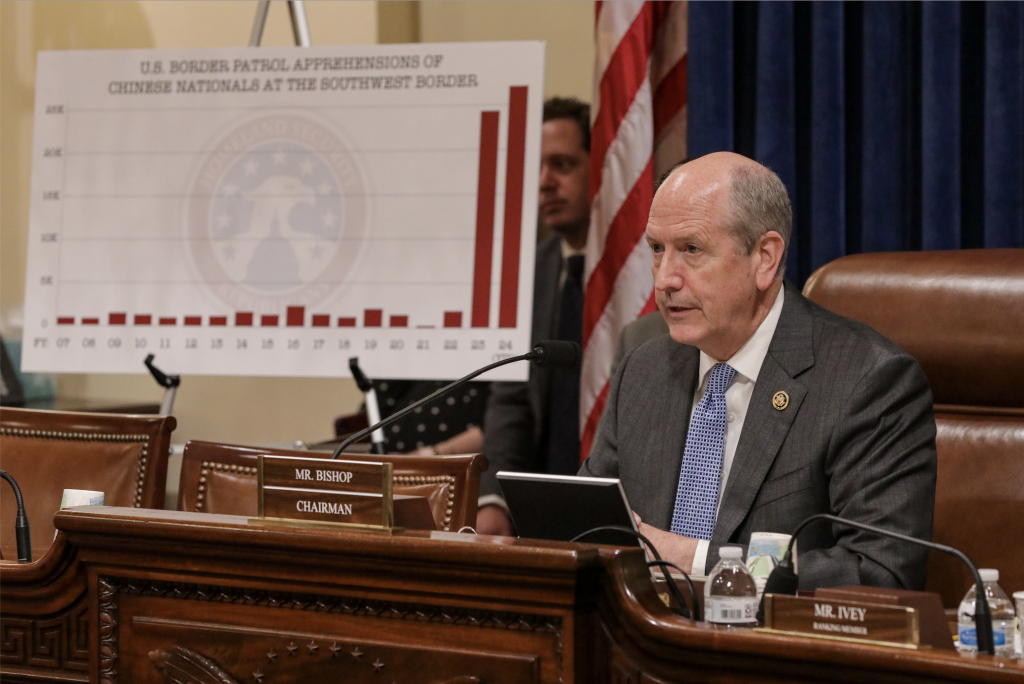“A Serious National Security Concern”: Subcommittee Chairman Bishop Opens Hearing on Surge of Chinese Nationals Illegally Crossing the Border
May 16, 2024
WASHINGTON, D.C. — Today, House Homeland Security Subcommittee on Oversight, Investigations, and Accountability Chairman Dan Bishop (R-NC) delivered the following opening statement in a hearing to examine the unprecedented flow of Chinese nationals across our borders—particularly between ports of entry along the Southwest border—and the national security implications of this historic influx.

Watch Subcommittee Chairman Bishop’s full opening statement here.

As prepared for delivery:
Today’s Subcommittee hearing will examine the unprecedented number of Chinese foreign nationals crossing the border and whether this represents a risk to homeland security.
Border Patrol records show that from 2007 to 2021 encounters of Chinese nationals illegally entering the United States at the Southwest border were relatively rare, averaging a little over 1,000 per year.
That changed dramatically under the Biden administration, rising from 1,970 in Fiscal Year 2022 to 24,048 in FY 2023, an 1100 percent increase.
In the last seven months, from October to April, Border Patrol has already encountered 27,496 Chinese nationals – shattering last year’s total.
At this pace, the full fiscal year will see encounters of illegal Chinese immigrants 2300 percent higher than the rate just two years ago.
This is a national security concern, and it’s not a new one. One year ago, the current Border Patrol Chief and then-Del Rio Sector Chief, Jason Owens, testified in a transcribed interview with the Committee that, “even without the increase, people coming from the PRC would be of concern to me. That’s always going to be a group we look at more closely and work with our partners, with FBI, to make sure they don’t pose a threat.”
I agree that there is a serious national security concern, and we should be looking closely at individuals coming from Communist China, the United States’ greatest adversary on the world stage.
Unfortunately, under the Biden administration, Border Patrol agents have been instructed that when processing Chinese nationals, they should conduct short, basic interviews, that include only generic background questions, instead of in-depth interviews. In other words, there is no serious vetting.
These questions simply ask about military service, education, birthplace in China, employment, and political affiliation with the CCP.
While agents only proceed to an in-depth interview if one of the answers in the basic interview is flagged, it begs the question – how likely is it that someone showing up at the border is going to admit that they are here to do the bidding of the Chinese Communist Party or perhaps the PLA?
Instead, that person will likely provide the answers their smugglers told them to give Border Patrol. Just give the right answers and come right on into our homeland.
These limited interviews, combined with a lack of reliable information from China to verify biographical claims and limited translation services, severely constrain CBP’s ability to conduct rigorous vetting for criminal and national security concerns.
One Border Patrol sector chief told the Committee that it could be difficult to determine the motives of those detained who come from distant countries, like China, stating that, “we try our best to figure out why they’re coming, but of course, that information can be hidden. Their agendas, their ideologies, the reason for them coming could be missed.”
This is especially true for “gotaways” – those who avoid apprehension, and who reportedly pay as much as $60,000 to be smuggled illegally into the United States.
The government has no idea who the “gotaways” are or why they are crossing the border and deliberately trying to avoid Border Patrol. But something tells me the motive wasn’t likely to be aboveboard.
Some Chinese nationals may be motivated to seek asylum on legitimate claims of persecution, such as Uyghurs from Xinjiang. But it is more likely that they come for economic reasons or other motives that do not meet the statutory requirements for asylum.
And considering the Biden administration’s failure to hold China to account, these Chinese nationals also know that it is very unlikely that they will ever be returned to China, under this administration’s policies, even if ordered removed by an Immigration Judge.
Some Chinese nationals may have more nefarious motives for coming to the United States. For example, federal indictments in North Carolina from last month show partnerships between Mexican drug cartels and Chinese transnational criminal organizations engaged in money laundering operations throughout the United States.
This was reinforced by testimony from federal counter-narcotics officials in a Senate hearing two weeks ago that Chinese criminal organizations have “emerged as the professional money launderers of choice for Mexican drug traffickers.”
Recent reporting has also uncovered that Chinese-run marijuana farms are all across the United States, and many of them exploit workers from China.
Transnational criminal organizations and the CCP see our open border as an opportunity. This surge of Chinese nationals at our border without recent precedent presents a major national security vulnerability, ripe for exploitation.
It makes no sense that the Biden administration refuses to take common sense steps to secure our border in the face of such obvious threats to our homeland.
Instead, we get more of the same catch-and-release policies that have set the country on this dangerous course for the past three years, and all that some can say is that the Congress should codify and institutionalize these very practices.
I want to thank our witnesses for being here today, and I look forward to their testimony.
###
